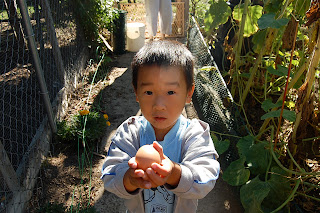"It is always very difficult for me to set forth my argument, because this argument is not a simple conception like a line, but is immense, if you will, like a desert or an ocean. So it is very difficult for me to know just what I can do in order to give you what I would, for I do not myself know the extent of this greatness. This desert or ocean is not a creation of my mind, my soul, my knowledge, my evolution, but it is Education. Not the education that you know, but an unknown education that is new, that is efficient, that gives help and a new orientation, a new knowledge, permit me to say, a new Wisdom to the world."
Dr. Maria Montessori
I read with interest and admiration the article written by Laura Flores Shaw, that appeared in The Huffington Post this last January 27th. The title: Montessori: The Missing Voice in the Education Reform Debate, stirred me up, as I've been pondering this mystery for decades. (See link below.)
And especially over the last few years, as the fatally-flawed system of traditional education has been revealing its warts to the masses. (I know, I know - before I go any further, let me clarify that I am not blaming teachers, as so many reformers and reporters have done.) It's not fair, and that is probably part of the reason that Montessori advocates have not pushed harder in the past. Most teachers work damned hard, and are passionate about helping their students. However, that being said, it is also part of the problem. Montessori knew that children are not "empty vessels" to be filled up with facts that an adult thinks they are imparting. Actually, as I get older, I've come to believe that there is a bit of arrogance in individuals who go into teaching to teach. Those are the people that I think of as "apple-wearers," that go into teaching to "help others," and "get the summers off". I picture them in quilted vests with apples on them, soaking up the adulation of parents and community. Well, maybe not so much anymore, but still, that's my mental concept of that sort of educator. I digress.
The article presented accurate, concise information about Montessori education, and questioned the absence of discussion of Montessori from the educational reform community. It's true, we never hear about Montessori even though education is such a hot topic these days. Ms. Shaw suggested that special interests who stand to profit from the status quo may be involved in the squelching. She's probably right that this is a component of the mystery. (A quick study of the numbers of government representatives that send their children to Montessori schools would be interesting, wouldn't it?) Another factor is that the general public knows very little about the method, or, even worse, has misconceptions about it. In fact, in my experience, people have dismissed and criticized Montessori because of faulty thinking. The first time this happened to me, a kindergarten teacher told me, "You don't want Montessori," shaking her head and raising her Maybelline brows." In a child development class I was visiting, a student said, "Montessori! Isn't that where they march the children around like little soldiers?" People seem to think Montessori education is a free-for-all, or military training, and these perceptions are based upon lack of understanding. My mentor used to say that she could have two different observers in her classroom on the same day, and one would come away saying, "It's too structured.", while the other would say, "There is not enough structure." It's because it's just so vast - it's almost too much to take in, just like Dr. Montessori said...the ocean...the desert. And I think it is entirely possible that some people will never get it. There is serious science behind this stuff. How Dr. Montessori must have felt, trying to continually educate people about her discoveries. They were big. They are big, possibly beyond the scope and imagination of many people.
For a long time in my life, I just couldn't take it when people didn't get it. I loved the method too much, and I felt a sense of personal failure when people missed the beauty of it. Something that has helped with this at our school is a simple "Observation Checklist." (Checklist example below) I find that observers are not so overwhelmed by all the activity when they have specific things to watch for from the children in the environment. This provides them with some structure upon which to build their perceptions.
But my little checklist is beneficial after we get them in the door. We need to get more people in the door. We need to keep this conversation going, write those articles, share the research, shout if we have to - "...sound our barbaric yawps..." and challenge the powers that be to wake up and discover this "New wisdom," that is..."Education." With a capital "E."
The often misunderstood "line."
Movement and Cognition
Balance and Coordination
Music Appreciation
Fun
p.s. And we do march on the line. But not like soldiers. We march with the jubilance of children traveling to the beat of their own drum!
A simple checklist such as this seems to make observers more comfortable, give them a focus, and provide us with specifics to discuss at the end of their observation.
OBSERVATION CHECKLIST (Feel free to take notes!)
Points to look for when you observe
As you sit down to carefully observe in a Montessori classroom for the first time, what catches your eye? What do you notice on your second or third visit?
How is the classroom organized? What do you notice about the layout of activities, furnishings, and shelves?
Pay attention to the way the adults interact with the children. What do you notice?
Perhaps during your observation you will see the teacher correct or discipline a child. What do you notice?
As you observe, try to look for any unwritten rules and procedures that the children are following. What do you notice?
Focus on a particular child other than your own. Follow her work during the course of at least a half hour. How does she spend her time? How does she select work?
Hopefully, you will see the teachers present several different lessons during your visits to either small groups or individual children. What do you notice about the way they teach?
What do you notice about the educational materials on the shelves and how the children work with them?
Focus on various materials. What skills does each one isolate?
Try to catch children learning from one another.
What interactions do you notice between older children and younger children?
Is it apparent to you that some children have reached a level of self-direction and regulation, while others are still working to attain these traits?
by Laura Flores Shaw









